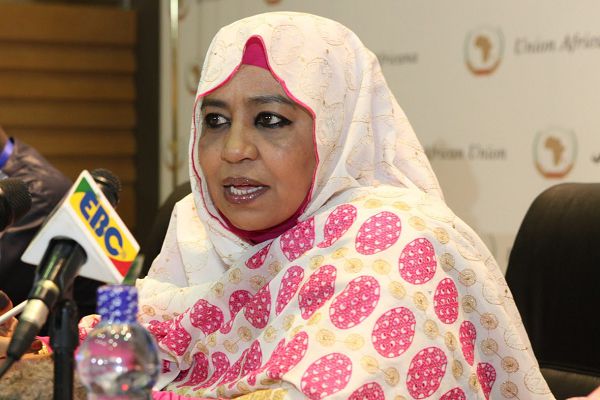
African First Ladies resolve to attain goals
The 2018 theme for the Organisation of African First Ladies Against AIDS (OAFLA) is “Transforming Africa through prioritising children, adolescents and mothers in the fight against HIV”.
In line with the theme, Ghana’s First Lady, Mrs Rebecca Akufo-Addo, met her counterparts from across Africa to hold further discussions on their contribution to the health and well-being of children, the youth and women on the continent during the 73rd United Nations General Assembly (UNGA) held at the UN Headquarters in New York in September this year.
The meeting, which was held on the fringes of the General Assembly, also discussed the 2019 to 2023 strategic plan for the OAFLA.
Focus
The focus areas in the document include HIV&AIDS, non communicable diseases (ncds), reproductive, maternal, new-born and child health (rmnch), gender equality, women and youth empowerment, universal health coverage (uhc), social security and protection, and institutional capacity strengthening.
The meeting also featured first ladies from Sierra Leone, Zimbabwe, Nigeria, Lesotho, Uganda, Madagascar, Congo, Burundi, Ethiopia and Burkina Faso.
Partnerships
OAFLA held another meeting in Dakar, Senegal, last month, on the “Merck More Than A Mother” campaign, which is seeking more partnerships with Africa and Asia, towards eliminating challenges confronting the health sector.
At the opening of the meeting, the fifth edition of the “Merck Africa Asia Luminary” conference, the Senegalese President, Macky Sall, welcomed the steadfastness of first ladies in Africa to partner Merck Foundation to champion “Merck More Than A Mother” initiative, describing it as fulfilling and on point.
He said first ladies and their offices had shown greater commitment by working as ambassadors towards creating greater awareness of infertility and cancers through capacity building in their various countries, pointing out that “you dare not fail to support them. You do so at your peril.”
Eight first ladies, including the host, Mrs Mareame Sall, Mrs Rebecca Akufo-Addo and others from Botswana, Burundi, Central African Republic, Chad, Niger, Sierra Leone and Zambia, graced the event organised by Merck Foundation, a humanitarian arm of Merck Germany, on the theme: “Together We Can Make A Difference”.
They pledged to collectively partner “Merck More Than A Woman” initiative to create greater awareness of infertility and cancers which are perceived mostly to afflict women and also to become ambassadors of infertility and partner with the Merck Foundation to mainstream issues of childlessness in women which led to violence, discrimination, stigma and ostracism by the society.
Another meeting
Yet another meeting is going on in Accra, which has brought African First Ladies from Ghana, Liberia, Niger and Sierra Leone to take a strong stand against early child marriages and other socio-cultural practices targeted at girls in Africa.
The meeting was dubbed: “The 2nd Girls Summit on Ending Child Marriage.”
Also present were gender ministers, civil society groups and technical advisors from parts of the continent, including Mozambique, Sudan, Zambia and Zimbabwe.
The two-day summit, on the theme: “Enough of the silence”, is being organised by the African Union (AU) and hosted by the Office of the First Lady of Ghana, and the Ministry of Gender, Children and Social Protection in partnership with Plan Ghana, the United Nations Children’s Fund (UNICEF) and the United Nations Population Fund ( UNFPA).
The commitment
Speaking at the opening ceremony, Mrs Akufo-Addo re-emphasised Ghana’s committed to fully implement its 10-year strategic plan framework on Ending Child Marriage, which was launched in 2016 with a two-year operational plan to ensure youthful livelihood and socio-economic transformation by 2030.
She, therefore, called on all African First Ladies, civil society, the AU and all other stakeholders to work assiduously to end child marriage, saying the high-level gathering was a clear indication of the importance attached to issues that affected girls and the commitment to make a difference in the lives of girls and young people.
Allocate more resources
For her part, the Commissioner of Social Affairs of the African Union Commission (AUC), Ms Amira El Fadil, said the AU launched a campaign in 2014 to end child marriage, which was adopted by 24 member states.
She pointed out that out of the number of member states who adopted the campaign, 30 per cent enforced and enacted laws that protected girls, while 41 per cent developed a national strategic plan.
The Elizabeth Glaser Pediatric AIDS Foundation (EGPAF) acknowledges the critical role that First Ladies play in advocating at the national and sub-national levels on behalf of their citizens in transforming Africa.
Priority
In doing so, priority should be given to children, adolescents and mothers in the fight against HIV&AIDS, non-communicable diseases (ncds), reproductive, maternal, new-born and child health (rmnch), gender equality, women and youth empowerment, universal health coverage (uhc), social security and protection, and institutional capacity strengthening.
To attain the vision of a developed Africa with healthy and empowered children, youth and women, there is the need for governments, stakeholders and civil society organisations and individuals to make significant contribution to the health and well-being of children, youth and women in Africa.
This offers excellent opportunities for all stakeholders in the campaign to take stock of gaps and to identify where progress needs to be accelerated, with planned and sustained programmes and the commitment of resources to drive the campaign to attain positive results.
In doing so, particularly in Ghana, the country can achieve the operational plan to ensure youthful livelihood and socio-economic transformation by 2030.
